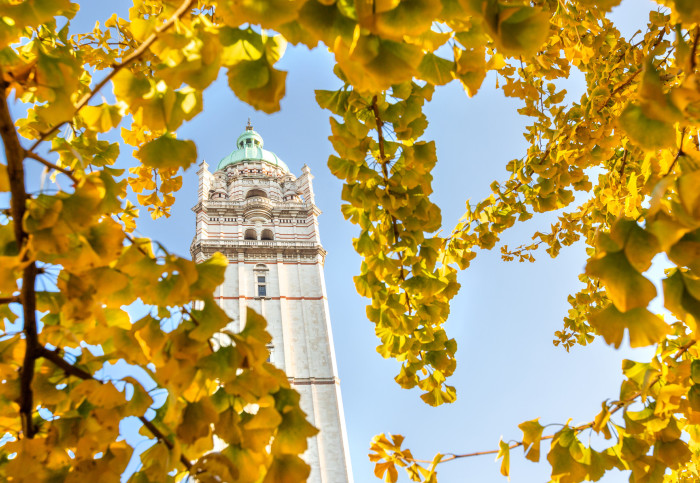President’s Community Fund brings new life to campus spaces

Students and staff are transforming Imperial’s campuses with support from the new President’s Community Fund.
The President’s Community Fund aims to enhance the student experience and make a lasting impact on the wider College community by improving existing facilities and creating new communal spaces, while encouraging collaboration across diverse parts of the College.
Through the support of generous donations, the fund has £1m available annually until 2026 to support projects across all campuses. With overview from the Estates Strategy Group, applications are welcomed from both students and staff for proposals to enhance our environment and best suit the way we work, study, and socialise as we emerge from the pandemic.
The fund also works in lockstep with the College’s Learning and Teaching Strategy. Since 2017, its ambition has been to create an ecosystem in which students and staff can work together to design campuses that encourage social interaction, are flexible from a digital technology perspective, and empower students to explore their curriculum to the fullest.
The projects and how they benefit the College community
A series of exciting new projects have launched after securing funding in 2021-22.
Sir Alexander Fleming Building foyer: This project reimagines communal areas in the SAF building as new collaborative spaces, to be used in the time immediately before and after scheduled teaching. The COVID-19 pandemic has further increased the importance of ad hoc interactions in this time to consolidate students’ learning and facilitates community-building. This will improve accessibility and inclusivity of the space, ensuring more students feel welcome on campus.

Reynolds Bar and Café Refurbishment at Charing Cross: A contribution from the fund to this refurbishment aims to transform the existing café area into a cohesive, multi-purpose, modern space, comparable to the facilities on offer at the South Kensington campus and peer institutions. The project has created an inviting area for students to socialise in throughout the day and after-hours, with a kitchenette within the bar to ensure hot food is available for students into the evening. A new games area, stage, DJ booth and lighting system will allow a wide range of exciting events to be hosted at the Café.
Respite Room in the Chemistry Building: This space will be a student zone for relaxation and recuperation, in response to student concerns that there is an absence of such spaces at College. This room is not designed as a workspace, but instead provides comfortable seating for quiet contemplation and readjustment during a stressful day. The concept of this space is supported by the Head of the Disability Advisory Service, and will act as prototype for other departments.
Expansion of Hackspace Bio-Lab capabilities and Co-working zones: Exciting new improvements to the prototyping equipment and communal areas at Imperial's Advanced Hackspace in White City will support its vibrant community of makers and inventors. This meets increasing student demand for the facilities from across the College, and will allow greater access to powerful computing workstations, essential for computer-aided design and software and app development. This aims to strengthen the hackspace community and increase student exposure to the wider Imperial entrepreneurial ecosystem.
Greening White City: In response to the need for more temporary green space on the White City Campus while long-term plans for large outdoor spaces are implemented, this project introduces a range of greening features on the north site. These will include two moveable parklets, green walls, green roofs and planters around lampposts. Green space is crucial to creating healthy, sustainable, and appealing urban environments, and promoting biodiversity is also an important aspect of Imperial’s Sustainability Strategy.
Blackett Terrace and Cycle Area: This development is a student-led redesign of shared spaces and bike store outside the Blackett building. This involves a redesign of the community space at the main entrance of the Blackett Building, increasing the provision of staff and student study space, providing space for informal staff-student interaction, and strengthening the discipline identity in the area.
Common spaces in Charing Cross Hospital: Common spaces have a new and significant value in the post-pandemic era. This project will improve the layout and functionality of the breakroom and kitchen area at Charing Cross Hospital, with an end goal of encouraging teams to interact in a shared area. This improvement will also make it a better environment to host future lectures and seminars, fostering dialogue between departments and institutions.

Centre for Languages, Culture and Communication Creative Hub: The new Creative Hub will be a student-centric space designed to be an open environment for students to think, collaborate and co-create. The Centre for Languages, Culture and Communication is a cross-faculty, cross department learning hub, where students and staff can engage with subjects outside their own area of study and expertise. The development will welcome new front and rear breakout areas, a students’ welcome area, and a reception area.
Community DIY Bike Workshop on Silwood Park Campus: This project aims to empower staff and students at Silwood Park to fix their own bikes through do-it-together bike mechanics facilities, promoting self-reliance and building confidence in new skills. During the spring and summer, the space and equipment will support staff and students with fixing their own bikes and developing mechanical skills.
Get involved
Know of a College space with untapped potential? Interested in submitting an application?
The next deadline is 15 November 2022 – details on how apply can be found on the President’s Community Fund webpage. The Estates Strategy Group will review applications and approval proposals.
For further information, please contact communityfund@imperial.ac.uk.
Article text (excluding photos or graphics) © Imperial College London.
Photos and graphics subject to third party copyright used with permission or © Imperial College London.
Reporter
Murray MacKay
Communications Division